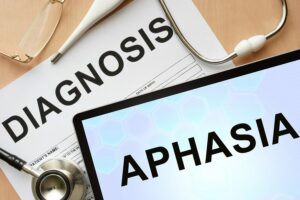
A stroke can affect the left side of the brain, which is where the centers for language and speech are located. When stroke survivors lose their ability to understand spoken language, read, write, or speak, it is known as stroke-related aphasia. If you are a family caregiver with an elderly loved one that has had difficulty in regaining language and communication skills after their stroke, you should learn more about the different types of stroke-related aphasia. That way, you can work with their speech and language therapist on ways to boost their recovery, during sessions and at home.
- Amnesia aphasia leaves stroke survivors with a gap in the names for people, places, and events. It is considered to be the least impactful form of aphasia as most people retain overall speech and comprehension. The word retrieval failures are especially prevalent with nouns and verbs, which can still trigger plenty of frustration for both stroke survivors and their caregivers.
- Expressive aphasia means that the stroke survivor can understand others but cannot come up with the words they need to communicate verbally. They may have difficulty forming words and sentences or manage only a few words out of what they really want to say. Seniors with expressive aphasia may also substitute words, resulting in nonsense sentences that are hard to understand.
- Receptive aphasia is when stroke survivors cannot understand the words that are being spoken to them. They may also not understand written words, even though they are clear and simple. Many people liken it to being dropped in a foreign land where a person doesn’t know anything about the language. They can hear speech and see lettering, but simply cannot process.
- Global aphasia is the most serious of the conditions, because it affects nearly all their language ability. Stroke survivors with global aphasia may not understand words and sentences being spoken to them and cannot form any words of their own. With global aphasia, elderly people also cannot write or read, even if they were literate before their stroke.
Recovery from each of these types of aphasia is possible, but each person is differently affected and it can take a long time with a lot of hard work. The best progress is made with close and frequent sessions with a speech-language therapist. Examples of treatment include non-verbal communication techniques, art therapy, sing therapy, word association exercises, physical and occupational therapy, and medication.
Family caregivers can continue to help elderly loved ones with aphasia by working with therapists to find out what kind of activities and exercises might benefit them at home. Examples might include playing word-based board games, writing birthday cards to relatives, singing together, and doing word flashcards. Also when communicating with elderly loved ones, family caregivers should remember to be patient, give their relative time to express themselves, work on nonverbal cues and gestures and to make eye contact when speaking. With patience and love, elderly stroke victims can learn how to compensate for any lost language skills.
If you or an aging loved one are considering hiring caregiver services in Rahway, NJ, call the caring staff at Helping Hands Home Care today at 908-418-4299. Providing Home Care Services in all of Northern and Central NJ, including Clark, Westfield, Cranford, Scotch Plains, Rahway, Linden, Summit, Edison, Elizabeth, Mountainside and the surrounding areas.
Source:
http://www.stroke.org/we-can-help/survivors/stroke-recovery/post-stroke-conditions/physical/aphasia
After graduating from Seton Hall University with a BS in finance Helping Hands Homecare’s Owner / President, Robert D’Arienzo, went to work on Wall St. for six years. However, after Robert’s grandmother became ill with stomach cancer Robert and his family needed to find assistance in the home for her. After many trials and tribulations Robert could see that there was a great need for quality home care services here in NJ and loved the idea of being able to assist other families who were going through what his family went through with his beloved grandmother.
Thus, Robert had found his passion. After almost a year of preparation Robert opened Helping Hands Homecare in 2003. Robert wanted Helping Hands Homecare to focus on providing the highest quality of caregivers, exceptional customer service, and providing a service that familys could depend on in their time of need. Since then Helping Hands has assisted hundreds of individuals with the simplest of needs to more complex cases while preserving those standards set out many years ago.
Robert is a Google Verified Author
- How Companion Care Can Help Your Parent Avoid Depression - April 22, 2025
- How Alzheimer’s Care Helps Family Caregivers - April 7, 2025
- How In-Home Care Can Help Seniors Recover from Surgery or Illness - March 24, 2025




